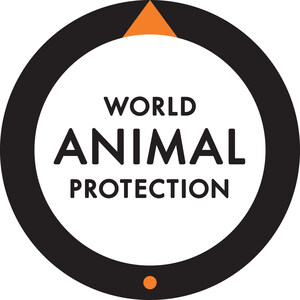NEW YORK, Jan. 15, 2020 /PRNewswire/ -- Today, World Animal Protection, a global animal-welfare organization with offices in 14 countries released a global report which investigates the welfare standards of chickens raised for meat being sold and consumed at some of the world's biggest fast-food chains such as KFC, McDonalds, and Burger King.
"The pecking order 2020" ranks how fast food restaurants are performing on their commitment, ambition, and transparency regarding the welfare of chickens in their global supply chains, revealing some alarming findings. Many companies' welfare standards are "poor" or "very poor", meaning consumers may be unwittingly buying meat from chickens that are subject to unnecessary suffering and cruelty.
Most of the birds being served at these restaurants live in cramped and barren environments with no sunlight, and many will suffer from lameness and skin lesions. Moreover, most companies are not showing any intention to improve their standards.
Companies are assessed via publicly available information in three areas:
- Commitment, their policies clearly state how important the welfare of chickens is to the company;
- Ambition, a defined timeline that demonstrates the objectives, targets and promises a company has made to improve chicken welfare and when they will meet them; and
- Transparency, through their performance reporting, and how clear the company is about living up to its promises on chicken welfare.
The companies assessed are Burger King, Domino's Pizza Group[1], Domino's Inc. [2], KFC, McDonald's, Nando's, Pizza Hut, Starbucks and Subway. Key findings from "The global pecking order 2020" are:
- Domino's Inc. received a score of "0" in the global ranking indicating they have done nothing to improve chicken welfare.
- Four companies — Burger King, Pizza Hut, Domino's Pizza Group, plc and Domino's Inc. were classed as having "very poor" chicken welfare in the global report.
- Commitments are not coming fast enough. Over 160 companies globally have signed up to the Better Chicken Commitment but two-thirds of the companies assessed have not.
- Existing commitments are piecemeal and limited to just the USA, Canada or a small number of European countries, so the geographic scope is too narrow. More progress is needed globally.
- Only five companies report on the performance of some broiler welfare indicators and no company is reporting performance on all welfare aspects. This makes it difficult to hold them accountable for the commitments they have made.
- Only a third (three of nine) of companies assessed scored above "poor" in the global ranking so most companies are still failing.
- Globally, KFC, has been ranked as "making progress", based on the company signing the Better Chicken Commitment in 2019 in a handful of European countries[3] — which includes using slower-growing chicken breeds and giving chicken more light and space to behave more naturally — and reporting performance.
- KFC's progress in Europe hides its failure to address chicken welfare in the US. It would be ranked fifth (tied) out of nine this year if the report were an analysis of the United States alone. Subway and Starbucks would top a US-only list having signed the Better Chicken Commitment in North America only.
Alesia Soltanpanah, Executive Director at World Animal Protection US says:
"More than 500,000 people from ten countries signed our petition calling on KFC to give chickens a life worth living, so it's a shame that KFC has only introduced commitments in six European countries. There is no good reason to limit animal welfare improvements geographically — chickens raised for meat in the US suffer just as much as birds in Europe. We urge KFC, Starbucks, Subway and all other fast-food chains to expand their circles of compassion and adopt the Better Chicken Commitment in all the countries in which they operate.
Billions of birds never get the chance to see sunlight or to grow at a healthy rate or behave naturally. Instead, their lives are full of pain, fear, and stress. There is no excuse — these iconic companies have the power to put an end to this suffering.
Consumers are becoming increasingly concerned about animal welfare, and while companies such as Burger King and Subway are getting positive headlines for their plant-based options, the chicken farms that supply fast food are still creating much suffering. We will continue to speak up for chickens to put pressure on companies to make real and meaningful change."
World Animal Protection is calling on these global companies to lead and ensure that any chickens that are being served at their restaurants are guaranteed a life worth living. The companies assessed in "The pecking order" have an enormous opportunity at their hands and could use their power to improve the lives of hundreds of millions of animals.
To find out more, visit: www.worldanimalprotection.us
Notes to editors
For media interviews, video and images, please contact Jeanne Turkheimer at [email protected]
World Animal Protection has launched the ranking as part of its Change for Chickens campaign, which is challenging the fast food industry to stop the cruelty and suffering in meat chicken production worldwide by committing to source from higher-welfare farms rather than factory farms.
World Animal Protection's Change for Chickens campaign urges the food industry to commit to global policy changes that will improve the welfare of billions of chickens. In particular, companies are expected to:
- Use chicken breeds that grow at a healthier rate.
- Ensure that chickens have the space to behave more naturally. Cages must never be used.
- Give chickens the opportunity to enjoy natural behaviors via enrichment — including perches or platforms and pecking objects — natural lighting and high-quality bedding.
- Ensure that chickens are slaughtered using more humane methods that avoid live shackling and render all animals unconscious before slaughter.
Currently, it is estimated that 40 billion chickens around the world each year are subjected to significant cruelty in factory farms. They are given around 40 days to live until they are slaughtered when they are still effectively babies. During that time, they live in crowded, barren, dark warehouses, Grown with little, if any, consideration for them as living, breathing, inquisitive animals, they are genetically selected to develop unnaturally fast, which places huge pressure on their hearts, lungs, and legs. As a result, they often live their entire lives in chronic pain, suffering from lameness, skin lesions, and even heart failure.
Food companies that continue to turn a blind eye to this cruelty are under increasing pressure to change their ways. World Animal Protection will review 'The pecking order' every year to monitor the progress of major fast-food brands. The organization hopes that future iterations of the ranking will highlight companies that are truly leading the way when it comes to chicken welfare.
About World Animal Protection
World Animal Protection (formerly known as the World Society for the Protection of Animals) has moved the world to protect animals for the last 50 years. World Animal Protection works to give animals a better life. Its activities include working with companies to ensure high standards of welfare for the animals in their care, working with governments and other stakeholders to prevent wild animals being cruelly traded, trapped or killed, and saving the lives of animals and the livelihoods of the people who depend on them in disaster situations.
World Animal Protection influences decision-makers to put animals on the global agenda, and it inspires people to protect animals and to change animals' lives for the better. More information on World Animal Protection can be found at www.worldanimalprotection.us
1 Worldwide minus USA and Canada
2 USA and Canada
3 KFC in Germany, UK, Ireland, Belgium, Netherlands and Sweden
SOURCE World Animal Protection

Related Links
WANT YOUR COMPANY'S NEWS FEATURED ON PRNEWSWIRE.COM?
Newsrooms &
Influencers
Digital Media
Outlets
Journalists
Opted In





Share this article